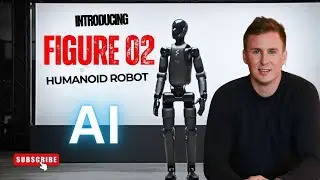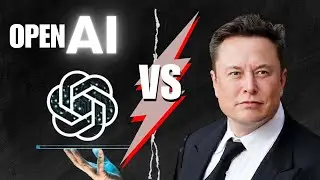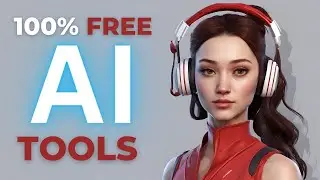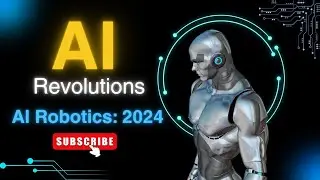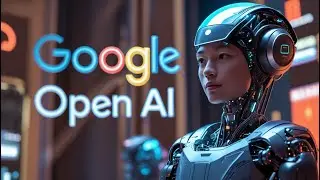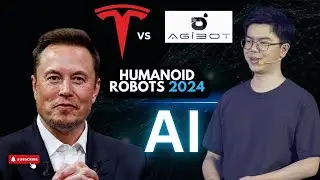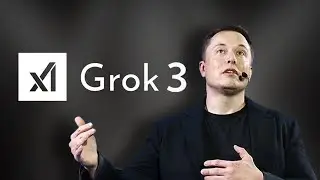Human-like Robots Powered by AI : Soon to Perform Better Than Humans
Things are really starting to heat up. There are some incredible new developments that are making the future we've all been waiting for a reality. We're talking about humanoid robots—not just in science fiction movies, but as something we could see in our everyday lives very soon! These robots could be doing everything from household chores to industrial work.
But first, let's ask you a question: have you ever imagined a future where humanoid robots are part of our daily lives?
Well, that future might be closer than you think! Let's focus on Shanghai, where the world's first factory dedicated to making humanoid robots is taking shape. This factory, built by a local startup called Agibot, is gearing up to start delivering robots as soon as October this year. Now, here's a question for you: do you think humanoid robots will make our lives easier and more productive?
AGIBOT has introduced an impressive lineup of humanoid robots, each crafted to handle a variety of tasks, from household duties to industrial roles. This lineup features both wheeled and two-legged robots, demonstrating AGIBOT's commitment to addressing diverse market needs with flexibility.
Agibot has been working hard in the Lin-gang special area, which is part of Shanghai's free trade zone, since February last year. Their founder, Peng Zhihui, has a strong background in AI technology, having previously worked at Huawei.
Now, these Agibot robots are no ordinary machines. They can perform a wide range of tasks, like assisting with interactive services, working in smart factories, conducting scientific research, and even participating in Special Operations. So, let's ask you: in what ways do you think humanoid robots can improve various industries?
But hold on, because Agibot isn't the only player in the game. They're set to compete with Tesla's Optimus robot, a humanoid robot project being developed by Elon Musk and his team. Here's a thought for you: what could a competition between these two companies mean for the future of robotics?
With their new factory preparing for mass production, Agibot is making a strong statement in the world of robotics. Agibot’s first deliveries are set to start in October this year, and by the end of 2024, they plan to deliver 300 robots – 200 bipedal robots and 100 wheeled robots.
Peng Zhihui’s extensive experience in AI technology, gained during his time at Huawei, has been instrumental in the development of Agibot's advanced robotics. His knowledge and expertise have contributed significantly to the company's progress in the field.
The diverse applications of Agibot's robots demonstrate their immense potential and significance in different sectors. As the technology continues to evolve, it will be fascinating to see the new and innovative ways these robots will be utilized in the future.
The standout model, Yuanzheng A2, boasts remarkable features. With a height of 5'9" (175 cm) and a weight of 121 lbs (55 kg), it is engineered to handle tasks requiring high precision, such as threading a needle. This exceptional skill places it in competition with Tesla’s Optimus, which has been highly anticipated since its introduction.
Alongside Yuanzheng A2, AGIBOT offers four additional models, each designed for specific purposes, from helping around the house to tackling sophisticated industrial jobs.
this robot is equipped with advanced sensors and AI technology that enable it to see, hear, and process information like text, audio, and visual data. It's designed to be incredibly precise – so precise that it can even thread a needle! How do you think this level of precision could be useful in different scenarios?
Peng Zhihui and his team are confident in their ability to commercialize these robots and keep costs under control. They believe they can produce and distribute these robots more efficiently and at a lower cost than Tesla. Do you think their strategy could give them an edge over their competitors?
Another Company, Unitree Robotics, the Chinese company, which initially focused on four-legged robots, has now entered the bipedal humanoid robot market with their G1 model.
The G1's compact design allows it to fold down small enough to fit in a cupboard, and its 23 degrees of freedom in its joints enable it to move with human-like agility.With a battery life of about 2 hours, the G1 offers versatility and practicality for various applications.
The G1 could be the household helper we've all been waiting for!
Unitree isn't the only company pushing the boundaries of robotics. Stardust Intelligence has just launched their Astrobot S1, designed with AI in mind to be a versatile and intelligent robot assistant. The S1 can handle complex, long-sequence tasks like preparing food, brewing tea, and even playing musical instruments! It can perform Wing Chun martial arts and throw basketballs with impressive precision.
Stardust Intelligence's goal is to complete the commercialization of the S1 by the end of 2024.








